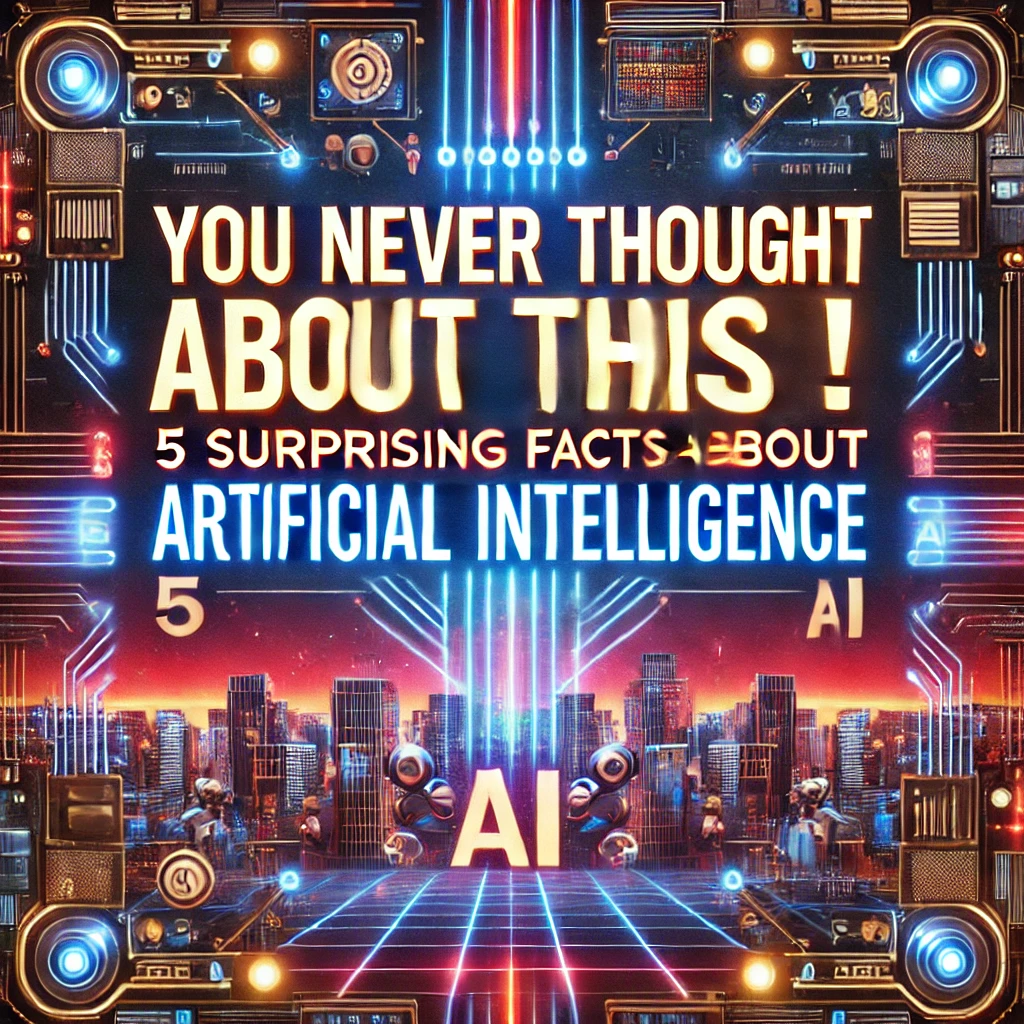
You Never Thought About This! 5 Surprising Facts About Artificial Intelligence
Artificial Intelligence (AI) has rapidly evolved over the years, transforming industries and reshaping how we interact with technology. While we often hear about AI’s impact in fields like healthcare, finance, and entertainment, there are some surprising facts about AI that many people never think about. In this article, we will uncover five surprising facts about AI that could change the way you view this groundbreaking technology.
1. AI Can Have a Sense of Humor
You might be surprised to know that AI can understand and generate humor! Thanks to advancements in natural language processing (NLP) and machine learning, AI has the ability to recognize humor in text and even create jokes. In fact, some AI programs are being trained to create stand-up comedy routines and write humorous scripts.
One popular example of AI generating humor is OpenAI’s GPT-3, which can compose witty replies, generate memes, and even create entire comedic narratives. While AI humor is still in its early stages, its development is fascinating, and researchers are continuously improving its comedic timing.
Why is this important?
The ability for AI to generate humor opens up new possibilities for content creation, customer service, and entertainment. Chatbots and virtual assistants, for instance, can use humor to enhance user experience, making interactions more engaging and human-like.
2. AI Can Write Novels and Poetry
Did you know that AI is now capable of writing novels and poetry? It might sound unbelievable, but AI systems are being trained to generate entire books and poems, sometimes indistinguishable from works created by humans. GPT-3, for example, has been used to write short stories, poems, and even entire novels with impressive narrative structure and emotional depth.
AI-generated literature often explores themes like human existence, technology, and the future, and it can even mimic the writing styles of famous authors. Some authors use AI as a tool for inspiration, while others have even published AI-generated works.
Why is this important?
AI’s role in the creative industry is reshaping how we approach writing. Authors and content creators are beginning to explore collaboration with AI tools to generate new ideas, stories, and artistic expressions. AI is helping break down barriers for aspiring writers and providing innovative ways to produce literature.
3. AI Can Recognize Emotions
It’s no secret that AI is good at processing data, but did you know it can also detect and interpret human emotions? AI-powered systems can analyze facial expressions, voice tone, body language, and even text sentiment to identify emotions such as happiness, sadness, anger, or surprise. This is known as affective computing.
For instance, AI is used in customer service to gauge the mood of a caller and adjust its responses accordingly. Additionally, AI-driven tools like facial recognition software can detect emotions during video calls or conferences to better understand the feelings of participants, improving communication and interaction.
Why is this important?
Emotion detection can revolutionize industries like customer service, mental health care, and even marketing. Businesses can use AI to personalize customer experiences by adapting their tone and responses based on detected emotions. In mental health, AI is being used to provide real-time emotional support to individuals, offering suggestions or alerting professionals when needed.
4. AI Can Help Combat Climate Change
Artificial intelligence is playing a critical role in the fight against climate change. AI technologies are being leveraged to predict environmental trends, optimize energy usage, and create sustainable solutions. For example, AI can analyze data from satellites to monitor deforestation, track wildlife populations, and predict natural disasters like hurricanes or wildfires.
In agriculture, AI helps farmers optimize crop yields while reducing water usage and pesticide application. Similarly, AI is being used in the development of clean energy systems, helping to predict energy demands, optimize wind and solar power usage, and improve the efficiency of electric grids.
Why is this important?
AI can be a powerful ally in the battle against climate change. By using AI to analyze large-scale environmental data, we can make more informed decisions about how to mitigate the impacts of climate change and develop sustainable practices. AI is also helping businesses and governments transition to renewable energy, reduce emissions, and implement green technologies.
5. AI Can Become Conscious (In Theory)
One of the most fascinating and controversial aspects of AI is the possibility that it could one day achieve artificial general intelligence (AGI) — a form of AI that can understand, learn, and apply knowledge across various domains, similar to human intelligence. Some experts believe that if AI ever reaches AGI, it could possess consciousness, self-awareness, and the ability to make decisions independently of human programming.
While this idea is still highly theoretical and the subject of debate among AI researchers, the potential for AGI to develop consciousness has serious ethical and philosophical implications. What would it mean for humanity if an AI system became self-aware? Would it have rights? Could it surpass human intelligence?
Why is this important?
The debate over AI consciousness raises important questions about the future of technology and our relationship with it. It challenges us to consider the ethical implications of creating highly intelligent machines and the responsibility we bear in ensuring they are used for the benefit of society. While AGI is still far from reality, it’s essential to think ahead about its potential impact.
Conclusion
As AI continues to advance, it’s essential to keep an open mind about the many ways it is surprising us every day. From generating humor and literature to fighting climate change and potentially becoming conscious, AI is proving to be much more than just a tool — it’s becoming a transformative force across all aspects of life. By understanding these surprising facts about AI, we can prepare for a future where artificial intelligence plays an even greater role in shaping our world.









